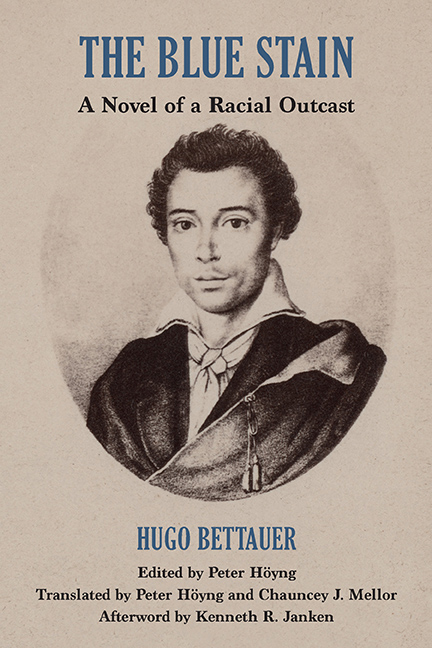Introduction
Published online by Cambridge University Press: 21 August 2018
Summary
When on the very last page of Hugo Bettauer's 1922 novel The Blue Stain: A Novel of a Racial Outcast (originally in German Das blaue Mal: Der Roman eines Ausgestoßenen), the novel's protagonist, Carlo, decides to fight for the civil rights of African Americans in Atlanta by joining The National Association for the Advancement of Colored People (NAACP), it is impossible for the reader not to be moved by his late but daring decision. Right up until Carlo makes this choice, the reader is ready to accompany this young man on his return to Europe, where he believed he could leave behind the appalling racism that he had encountered, first in New York City, later in the forests of North Alabama, and finally in Atlanta, Georgia. He longs to shed the role of the outcast, as the subtitle of the novel brands him. Instead, Carlo desires to thrive in Vienna, Austria as he once did, albeit no longer in a reckless and immature manner. He appears poised for a homecoming to a society that had treated him as one of its own, as a somewhat exotic white man.
In this final turn of events, the novel strikes a bracing and stunning chord: Carlo, who was conceived by his white European father and his mulatto mother in Atlanta during the post-Reconstruction period and was raised by his father in Vienna after his mother's death, had for so long insisted on his whiteness and resisted his blackness, but now finally and fully accepts his dual, mixed-race identity. The “blue stain” under his fingernails, a condition alleged to provide evidence of black heritage, remains a visible sign of his parents’ miscegenation. Even as Carlo's vicissitudes amaze us, his life story simultaneously reveals its shaping not only of his, but also of our identities: we are born first as human beings, and it is the dominant society that then sees or does not see the color, gender, or other biological characteristics of a person, that determine whether this person is treated by social convention as “normal” or is stigmatized as “other.” Should one succumb to the societal norms and values of the majority, or should one resist with all one's might those overbearing pressures and forces?
- Type
- Chapter
- Information
- The Blue StainA Novel of a Racial Outcast, pp. xiii - xxxivPublisher: Boydell & BrewerPrint publication year: 2017

